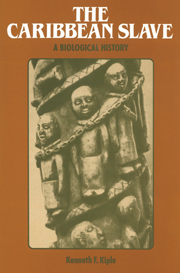10 - Fevers and Race
Published online by Cambridge University Press: 19 October 2009
Summary
To those who are impelled by necessity, or induced by interest, to visit the torrid zone, and relinquish the blessings which flow from exercise in the delightful climates of the earth, in temperate regions; to those who exchange their native countries, which yield the free and unbounded enjoyments of spontaneous health, for such as no care, nor art, can ever make agreeable; – some cautions may be necessary – some precedents useful.
Benjamin Moseley (1789)The problem of whether there exists any disposition or immunity, in a particular race or population can only be solved when two or more races, or population groups, live side by side in contact with each other and under as similar circumstances as possible without any mixing of blood.
Folke Henschen (1966)Black-related diseases have occupied most of our attention to this point. We have seen Caribbean blacks dying of myriad ailments that ranged from epidemic cholera to endemic nutritional ailments to the chronic illnesses that accompanied them from Africa. Whites, by contrast, were troubled little by most of these diseases. Yet their demographic performance in the West Indies was even more dismal than that of their servants. In the words of Philip Curtin, “We know in a vague way that, in the Caribbean, the net natural decrease for Europeans was higher than it was for Africans, but not by how much or how long this situation persisted.”
This “situation” was not, as we know from Chapter 1, created by indigenous diseases; nor was it the creation of numerous illnesses of varied etiologies, such as those that plagued the slaves. Rather, major responsibility is borne by only two illnesses, both of them of African origin and both far more deadly to whites than to blacks.
- Type
- Chapter
- Information
- The Caribbean SlaveA Biological History, pp. 161 - 176Publisher: Cambridge University PressPrint publication year: 1985



